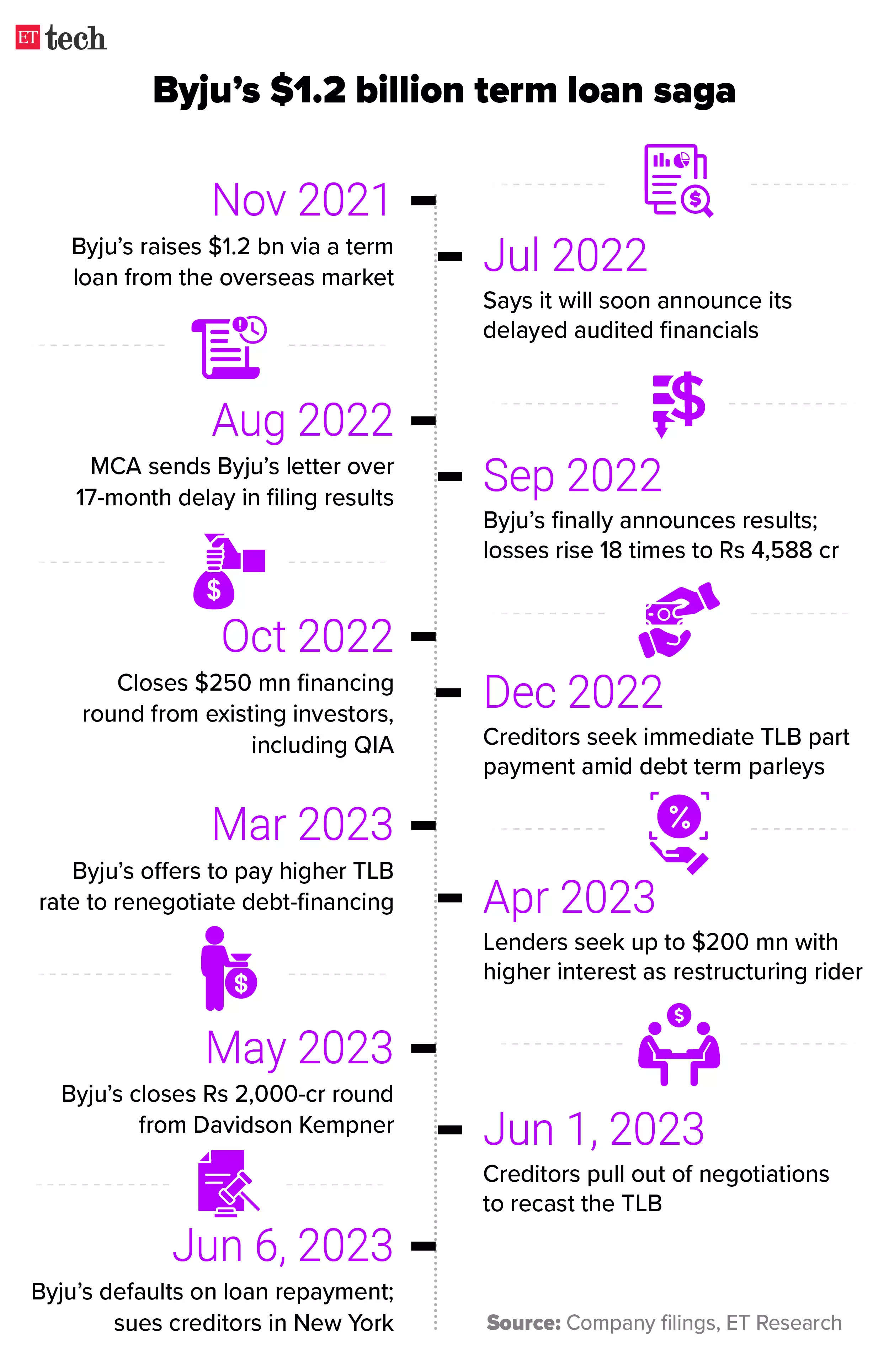Petitioners against Google get relief from Madras HC; Byju’s plans more job cuts
Also in this letter:
■ Getting Indians to pay for music is hard: Spotify India MD
■ ET Conversations with OpenAI CEO Sam Altman
■ EU mulling action on social platforms
Petitioners against Google get relief from Madras HC

On Thursday, the Madras High Court directed Google not to delist any of the companies that have filed petitions against it from the company’s Play Store, extending an interim injunction. The companies had sought relief from the court in their ongoing battle against Google over its billing practices.
At the same time, it also asked the startups to submit a report to Google on the total number of downloads they recorded in June, and directed them to pay a 4% commission to the search giant.
In the left corner… A while back, Bharat Matrimony, Shaadi.com and some other companies had approached the high court challenging Google’s billing policies and seeking to stop the company from kicking them off the Play Store.
On Monday, ET had reported that Unacademy, Kuku FM, TrulyMadly and QuackQuack had separately moved the Madras High Court against Google. Soon, three other companies — Aha, Stage and Kutumb — also filed petitions seeking relief. The court’s orders on Thursday apply to all of these petitioners.
Yes, but: A founder, who did not wish to be named, told ET that the court’s directions may be confusing because the judge had used the word downloads rather than subscriptions. And, that, he said, could unfairly enrich Google. “We may have 100 downloads of which 20 take up subscriptions. So, why should we pay Google for 100 downloads when we’re technically only making money off 20?”
Quote, unquote: “Google doesn’t have any right to ask for our private business data just because we are listed on its Playstore,” Vinay Singhal, cofounder and CEO of Stage, one of the petitioners, told ET. He added that these companies pay only 1-2% to payment gateways at the moment and that this would add an additional 4% burden without any services being provided.
Byju’s plans more job cuts to slash costs

Byju Raveendran, founder, Byju’s
When the going gets tough, employees are told to go — because the wage bill is the fruit that hangs lowest on the cost tree. And many have gone from Byju’s. As his season from hell continues, Byju Raveendran is once again looking to pluck that low-hanging fruit, in an effort to stem the red tide that threatens to overwhelm his once-celebrated startup. ET has learnt that Byju’s is set to terminate contracts that will affect scores of people in its sales division, just days after defaulting on an interest payment of $40 million on a $1.2 billion term loan.
Who they are: Many of these employees are contractual staff across on-ground sales teams, from third-party staffers such as Randstad and Channelplay, sources told ET, requesting anonymity in order to speak freely. Byju’s hires or lets go of these staff members on the basis of seasonality and demand for the business. While ET could not ascertain the total employee count affected by this move, a report by news site Morning Context, which first broke the news, pegged the number at 1,000 staffers.
Also read | Byju’s lenders scrap talks to restructure $1.2 billion loan

Going, going, gone: The layoffs add to back-to-back cost-cutting exercises Byju’s has initiated since last year to streamline operations, with digital K-12 (kindergarten to grade 12) education businesses finding it difficult to acquire new customers. Earlier this year, Byju’s had dismissed around 1,000 employees including many in senior strategy, technology and product roles. Last October, the company had sacked at least 2,500 employees, in one of the largest ‘rationalisation exercises’ by an Indian startup in terms of headcount.
Catch up quick: The cost correction comes right on the heels of the company skipping a quarterly interest payment of about $40 million earlier this week on a $1.2 billion term loan B (TLB), which is the subject of litigation. Byju’s has sued lender Redwood, an American investment management firm, and its related entities, in the New York Supreme Court for accelerating repayment of the loan.
Also read | Byju’s and the debt trap haunting Indian tech startups
It’s a challenge to get Indian users to pay for music: Spotify India MD

Spotify India MD Amarjit Singh Batra
In March, audio platform Spotify removed Zee Music’s entire Hindi film music catalogue after both parties failed to negotiate their licensing agreement renewal. Zee Music reportedly contributed to two dozen of Spotify’s Daily Top 200 Songs chart for India. ET spoke to Spotify’s India managing director Amarjit Singh Batra on whether this impacted the platform.
Some takeaways
On bringing back Zee: I can’t comment on the specifics, but there is no worry. We probably have the best catalogue of music in the country today. Today, we have content in almost every Indian language on Spotify. But there are times when some content is there, some is not. It’s part of the process. I wouldn’t read too much into that.
Bringing more Indian users: It’s a challenge to get Indian users to pay for music. What makes it harder is that the Indian users get a free-on-demand experience of the app wherein there are no restrictions on the songs they can listen to, which is not the case with the free experience in other markets.
Also read | Why subscription-focused Spotify wants to double down on advertising revenues in India
Layoffs & shows discontinued: I think a lot has happened in the global economy in the last one or two years. At Spotify, we consciously thought about leading the way to make podcasts an important part of the listening consumption pattern of our audience. In the next phase of the journey, we want to enable more creators to come onboard
Also read | Spotify lays off another 200 employees from its podcast unit
ET Conversations with OpenAI CEO Sam Altman

Regulation is a fine thing if it’s for grownups, says OpenAI chief Sam Altman. But, when it comes to startups and smaller companies in the field of artificial intelligence (AI), they should be allowed to flourish and not kept in check, he said. Altman spoke to the Economic Times in an exclusive interaction and touched on the breakneck speed at which generative AI — the backbone of ChatGPT, his company’s creation — is evolving. He also put forth his vision of the future.
Regulations affecting startups: Altman feels there shouldn’t be any AI-related regulations on smaller startups in the field of artificial intelligence. “We have explicitly said there should be no regulation on smaller companies. The only regulation we have called for is on ourselves and people bigger,” he said.
AI and job losses: On the risk ChatGPT poses to jobs, Altman said that there will be newer and better jobs going forward. “In two generations, we can adapt to any labour market change. There are new jobs and they are usually better,” he said.
Not training GPT5 right now: Altman also clarified that OpenAI was not currently training GPT5 — the successor to GPT4. “We have a lot of work to do before GPT 5. It takes a lot of time. We are nowhere close to it,” he said. “There need to be more safety audits; I wish I could tell you about the timeline of the next GPT,” he added.
Read the five key highlights from Altman’s conversation
Tweet of the day
Instagram, YouTube, TikTok and Twitter could face regulatory action in EU

Talk about a domino effect. In the aftermath of the sudden downfall of crypto exchange FTX and its subsequent bankruptcy last year, regulators have been tightening up to prevent fraud and protect consumers. While the US Securities and Exchange Commission (SEC) sued exchanges Binance and Coinbase this week, the European Union is now mulling action against social media platforms for promoting misleading ads on crypto assets.
Driving the news: Meta Platforms’ Instagram, Alphabet’s YouTube, TikTok and Twitter could face regulatory action after European consumer group BEUC complained to the European Commission and consumer authorities that the online platforms allegedly facilitate the misleading promotion of crypto assets.
What’s the complaint? In its complaint, BEUC said the proliferation of misleading advertisements of crypto assets on social media platforms is an unfair commercial practice as it exposes consumers to serious harm such as the loss of significant amounts of money. It said this was happening through advertising and influencers.
Taking to court: The SEC on Tuesday sued Coinbase Inc, the largest US crypto asset trading platform, accusing it of illegally operating without having first registered with the regulator. A day before, it sued Binance for artificially inflating its trading volumes and diverting customer funds, as well as failing to restrict US customers from its platform and misleading investors about its market surveillance controls.
Today’s ETtech Top 5 newsletter was curated by Gaurab Dasgupta in New Delhi. Graphics and illustrations by Rahul Awasthi
For all the latest Technology News Click Here

